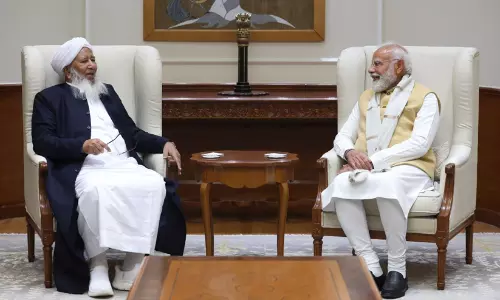
Universities now permitted to admit students twice a year
text_fieldsNew Delhi: Higher education establishments are now permitted to admit students twice a year by the University Grants Commission (UGC). With the latest ruling by the UGC, students can now be admitted in January/February and in July/August for the upcoming academic session, whereas previous norms only permitted admission during July-August.
The universities must now determine whether to offer admissions in both cycles or just one, depending on their faculty and infrastructure, following the UGC's ruling. Although biennial admissions are not required, the UGC has stated that this decision gives schools "flexibility" in case they choose to "increase their student intake and offer new programmes in emerging areas.”
UGC Chairman M Jagadesh Kumar told The Indian Express, “Every university offers admissions in July/August. In addition to this, if they wish to offer programmes in January, they are welcome to. A majority of the universities globally offer admissions in July/August. So, it is unlikely that they (universities) will stop that and start admissions only in January,” Indian Express reported.
“The situation can be unique to a particular institution; the challenges can vary from institution to institution. UGC will not do any micromanagement, it will only provide the broader regulatory framework enabling the institutions to work out the details themselves and implement it if they think they can do,” he added.
On whether universities may now be able to offer admissions to different sets of courses in the two admission cycles, he said: “It is a choice for them…depending on the infrastructure that is available. For a science programme, if they find that for the students admitted in the July session lab facilities are used in the daytime, they may want to use lab facilities in the evening for the session that began in January so that there is better utilisation of resources available in universities.”
This biannual admissions approach was initially attempted by the UGC with online and open and distance learning (ODL) programmes. Regarding the rationale behind the UGC's decision to permit biannual admissions, Kumar stated that the organisation discovered during the online and ODL trials that roughly half a million students who would have normally had to wait a full year to enrol in these programmes were able to do so as early as January.
“There is a possibility that even in the physical mode, students who have missed admissions for various reasons in July/August, will have the opportunity to join in January instead of waiting for one full year. It is also a global practice. It also has the potential to increase the GER (Gross Enrollment Ratio) also,” Jagadesh Kumar said.
Universities that now want to start a second session in January will need to alter their institutional regulations and receive approval from their executive and academic councils before proceeding. This twice-yearly admissions process is applicable to undergraduate, graduate, and a PhD programmes.
Regarding programmes where admissions are determined by entrance exams, the Chairman of the UGC stated, “For PhD admissions, currently all universities admit in July. We are conducting UGC-NET twice a year. So, universities can now begin to admit twice a year in PhD programmes. For postgraduate programmes, CUET (PG) is not mandatory, it is only an option and many universities admit based on their own entrance exam or marks in undergraduate programmes. Now they can offer biannual admissions in masters programmes”.
At the same time, in undergraduate programmes, except for central universities, CUET (UG) is not mandatory for other universities, he said. “They use a combination of admission criteria including CUET (UG) scores, their own entrance exam, and board exam marks. If any university wants to start UG programmes in a second session, they are free to do it,” the UGC chairman mentioned.
On whether entrance exams may now have to be held twice a year, he added: “Entrance exams are now technology driven. Ideally, if they are conducted twice a year, it will be beneficial to students. One-by-one we are trying to implement that. Over a period of time, I hope we will have most entrance exams conducted by the NTA twice in a year”.























